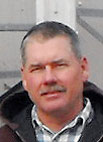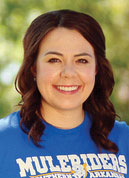 It keeps going.
It keeps going.
Early morning to early evening. Milking. Bottle-feeding. Whatever it takes to make a dairy operate day in and day out, that is what Jim and Diana Hale have been doing at their farm in Dutch Mills near Lincoln, Ark.
The Beginning
Jim’s brother Wayne lives nearby in Evansville, Ark., and their father Vernon lives close by, too. All three help each other whenever they need it, but run their own farms.
Jim’s herd of about 175, with 75 milking cows, started out with 35 when he began to milk in the mid-1980s. In addition to the milking operation, the Hales have three chicken houses and raise broilers for Simmons.
From the butter churns Diana Hale collects to the “Got Milk?” expression on the propane tank to the black and white dairy cow pattern on the feed bin to the Holsteins that dot the landscape near their house, there is no mistaking this is a dairy farm.
Although recent hard times have hit a lot of dairy farmers in Arkansas, Jim Hale says dairying was “a pretty good thing” when he got into it in the 1980s, and today, he said, it is still a steady living, as farming goes.
“It’s all about cash flow,” said Jim. “It enables us to stay here, work on the farm and raise a family.”
The Dairy
The Hales keep two bulls and do not do artificial insemination.
“I’ve been buying my bulls from the same guy for about 20 years,” said Jim, who added that he tries to keep improving the quality and production as he goes.
Milk from the farm is sold to the Dairy Farmers of America, and it goes to Hiland Dairy in Fayetteville, Ark. “Our milk is local,” said Jim.
Despite the ups and downs of dairy farming, he said, “You just live through them and go on and you just keep on doing it.”
He said the farm is a grass-based dairy that relies on pasture most of the time. The chickens and selling cull cows and bull calves supplement the dairy. “On the farm, you need to be diversified,” said Hale.
Future Generations
“We’re not really in it for the money,” said Jim. “We’re really doing it for the next generations, in case they want to do it.” Jim says his daughter, Jima, enjoys it and that farming has helped her develop certain values. “I appreciate more,” Jima said. “I’m a harder worker because of the farm. This farm has been my life for 21 years and it will continue to be my life.”
The Hales were voted Washington County Farm Family of the Year in 2009.
Diana works as office manager for the Arkansas Country Doctor Museum in Lincoln and has been doing that for about 3 years.
Jim has been collecting toy tractors for about 20 years. He has 150 of them on shelves that run along the top of the walls in the family home. One room is devoted to toy Allis-Chalmers tractors.“I always wanted toy tractors and my dad always bought us real ones,” said Jim, laughing about his toy tractor hobby.
He is also into the larger, antique tractors as a member of Rustic Relics, a club with members that get together regularly. The club conducts two tractor pulls per year.
In addition to all these activities, the Hales give a tour of the dairy for pre-kindergartners from Lincoln.
It is clear from talking to the Hales, that they truly enjoy life on the farm. “I’ve been around it all my life,” said Jim, and while it can get tough at times, he said, “a farmer’s going to farm and stay on the farm to farm.”
“It’s not an easy life,” said Diana. “But it’s a way of life.”
Jima says that farm work has taught her the value of planning ahead. Jim agrees about the importance of planning. “We’re always planning for the future,” he said. “What you do now affects next year.”







